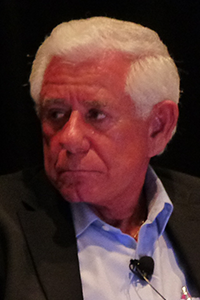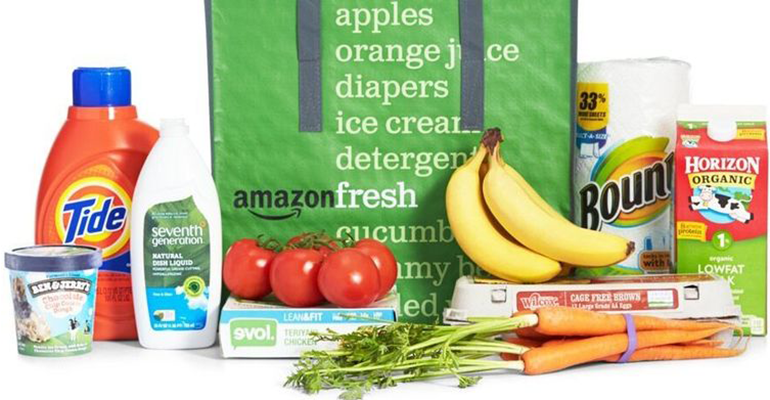For brick-and-mortar grocery retailers looking to compete directly with Amazon, some supermarket industry veterans have this advice: Don’t.
The smartest course for dealing with the Amazon threat is to build on your strengths, stay focused on your best customers and see if there’s anything to learn from the e-tail giant, retired executives from Kroger, Walmart and Vons said this week in the “Strategic Insights from Retail Produce Icons” session at the 2018 United Fresh Show in Chicago. The panel discussion was moderated by Greg Corrigan, senior director of produce and floral at Raley’s Supermarkets.
 “Anybody that takes on Amazon head-on, I think, is doomed for failure. So what can you learn from their successes and apply to your own business model?” asked Reggie Griffin (left), who served for nearly 11 years as corporate vice president of produce and floral merchandising and procurement at Kroger.
“Anybody that takes on Amazon head-on, I think, is doomed for failure. So what can you learn from their successes and apply to your own business model?” asked Reggie Griffin (left), who served for nearly 11 years as corporate vice president of produce and floral merchandising and procurement at Kroger.
“If you’re a retailer in Chicago or in Albuquerque, you have to figure out what your core competencies are and then what your investment strategy will be. Because you’re not going to be able to fund an endeavor to take on Amazon,” he explained. “The question is, how can you address the needs of your most loyal customers in your trade area and be more relevant to them? And it’s going to be a challenge.”
Online grocery shopping is being embraced by more consumers and becoming a regular part of their purchasing patterns, according to Griffin, who now leads his own consulting firm, Reggie Griffin Strategies. That means traditional grocers must adapt to the new dynamics while also differentiating themselves in their market.
“Customers today are a little more accepting of buying produce online. Those trends are going to change. People are going to get more used to the advantages and the disadvantages. One of the things brick-and-mortar can bring to the table is a little more excitement. It’s one thing to sit in your slippers and order something on Amazon at 2:00 in the morning. It’s another thing to go into a highly entertaining, exciting environment with all of the smells and all of the things that can happen in a brick-and-mortar store,” he said. “You have to play to your strengths and then chip away at some of the strengths that Amazon has — which is, ‘If you want delivery, I’ll give you delivery’ and ‘If you want to pick it up on your way home, I’ll have it at your front door.’ ”
 It doesn’t make sense for supermarket retailers to try to emulate Amazon’s model, noted Dick Spezzano (left), who served as vice president of produce and floral for The Vons Cos. for 17 years before starting his own firm, Spezzano Consulting Services.
It doesn’t make sense for supermarket retailers to try to emulate Amazon’s model, noted Dick Spezzano (left), who served as vice president of produce and floral for The Vons Cos. for 17 years before starting his own firm, Spezzano Consulting Services.
“You can’t be Amazon. You just don’t have that kind of investment strategy with those big fulfillment centers that they have,” he said.
At the same time, Amazon faces its own learning curves, including in grocery, Spezzano pointed out.
“How many years were they unprofitable? It’s only recently that they’ve become profitable. And they still struggle with groceries, don’t let anybody kid you. It’s not delivering three pairs of shoes or two dresses. It’s delivering heavy, low-price groceries. Think about what it takes when you carry bags out to your car and how heavy it is. Try to do that with a drone. So they’re still struggling in grocery — but they’ll figure that out,” he said.
“As a supermarket operator, you need to figure out what you’re good at and what’s the next thing you could be good at that fits in your supermarket,” Spezzano explained. “Or maybe it doesn’t quite fit. Maybe it’s a wine bar that will attract some Millennials on a Friday night, and maybe they’ll do some grocery shopping. So do some of the things that you do well or could do well that Amazon cannot do well.”
Bruce Peterson, who oversaw produce at Walmart for over 15 years as senior vice president and general merchandise manager of perishables, and afterward was president and CEO for two years at Naturipe Farms, said grocery retailers must establish their identity in the marketplace and be the best at it.
 “You first have to define who you are and what your value proposition is. And then you have to deliver that better than anybody else,” said Peterson (left), who currently leads the consultancy Peterson Insights. “Execution is critical today. If you fail in execution, in whatever it is you decide you want to be, you’re going to get disengagement because people have too many other choices to go get things.
“You first have to define who you are and what your value proposition is. And then you have to deliver that better than anybody else,” said Peterson (left), who currently leads the consultancy Peterson Insights. “Execution is critical today. If you fail in execution, in whatever it is you decide you want to be, you’re going to get disengagement because people have too many other choices to go get things.
“The neat thing about fresh fruits and vegetables is that, like any commodity, it’s generally available,” he continued. “You have the smallest, the ugliest and the nastiest on one side, and the biggest and the most beautiful and delicious on the other side. The Amazons of the world can’t get enough of the premium-quality items; they can’t get it. You can win in that space. That’s the deal. If you want to be the cheapest on the block, you’re not going to win. But you can be the best one on the block.”





